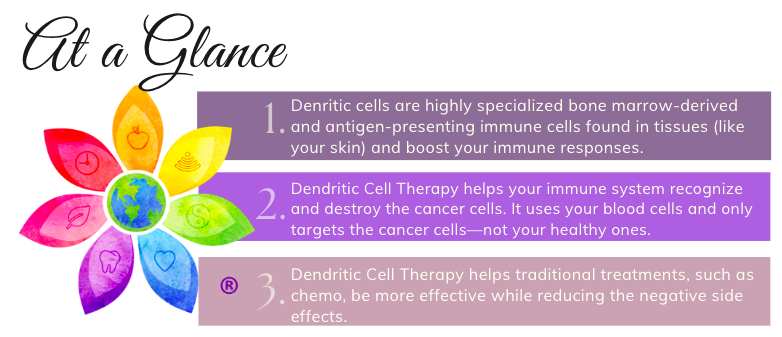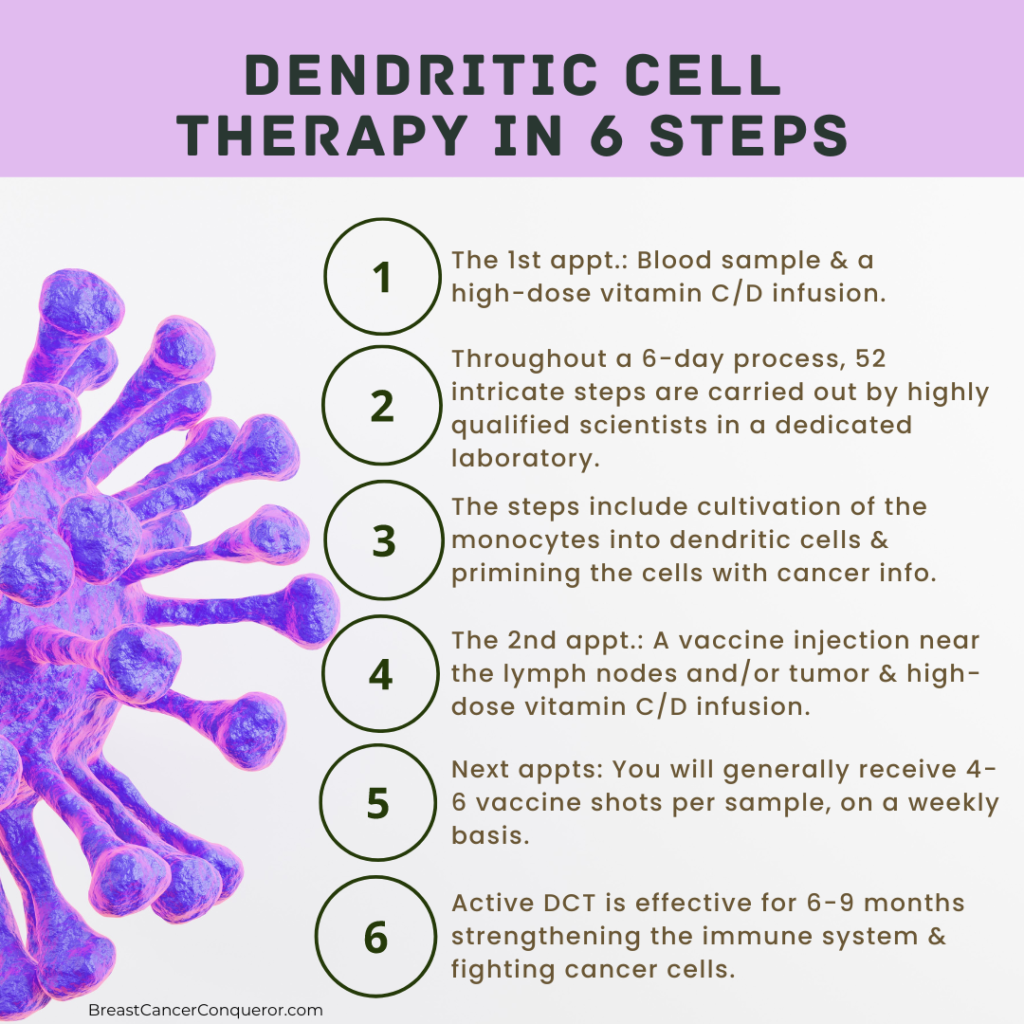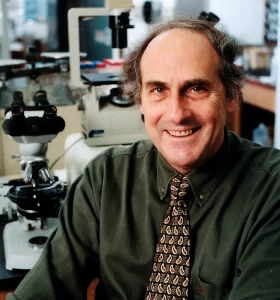
Please note: This blog intends to provide you with education and possible options for your healing journey. Please do not try Dendritic Cell Therapy or anything new before discussing it with your medical team.

What is Dendritic Cell Therapy?
Before we discuss the therapy, let’s start with dendritic cells. Here’s the simplified explanation: They are highly specialized bone marrow-derived and antigen-presenting immune cells found in tissues (like your skin) and boost your immune responses. This is done by inducing or regulating innate and adaptive immunity. To learn more, please check out this study. They get their name from the tree-like shape that fosters communication between harmful antigens and lymphatic T-cells.
And now, let’s dive into Dendritic Cell Therapy (DCT).
This therapy helps your immune system recognize and destroy cancer cells. It uses your blood cells and only targets the cancer cells—not your healthy ones. Therefore, this therapy helps you spend less time dealing with the symptoms of conventional cancer treatment and more time actually fighting the cancer cells. In addition to breast cancer, it also helps people heal from the colon, liver, kidney, lung, prostate, cancers of the blood, and several other types of cancers.
Dendritic Cell Therapy + Traditional Treatments
DCT also helps traditional treatments, such as chemo, be more effective while reducing the negative side effects. This 2021 study stated, “Thus, the vaccine’s ultimate role may lie in the combinatorial approaches of DCs-based immunotherapy with chemotherapy and radiotherapy, more than in monotherapy.” It also found, “The synergy between cancer vaccines and conventional therapy (chemotherapy and radiation) has demonstrated a potential role for immunotherapy in multi-modal treatment paradigms. With an improved understanding of tumor biology, checkpoint biology, and immune evasion, we will be able to time and deliver therapy to maximize tumor reactions, promote in situ antitumor immune responses, and enhance patient outcomes.”
While Dendritic Cell Therapy is FDA approved and can be a fabulous option, it is not a solo miracle therapy. The effectiveness of DCT also depends on how you eat, sleep, exercise, manage stress, etc. As all those factors can either strengthen or weaken your immune system.

The Dendritic Cell Therapy Process
The short answer:
It is a withdrawal of a small amount of blood. Once it is processed, it gets put back into your body. Since you will be using your own cells, DCT treatments are never rejected. Side effects are almost non-existent—love that!
The more detailed answer:
- A doctor will prescribe DCT after a review of your case notes and blood tests. The doctor should also prescribe complementary ways to boost your immune system so that DCT can be effective as possible. This could include changes in your diet, natural remedies, once-physiotherapy, stress management, etc.
- A small sample of blood will be drawn and taken for a highly specialized production process consisting of 52 intricate steps carried out by highly qualified scientists in a dedicated laboratory.
- In the lab, “…the monocytes are separated from the blood sample and cultivated into dendritic cells primed with modified instructions for the immune cells. These instructions will vary depending on the patient’s type of cancer, defense cell composition, blood type, and genome.”
- After about 1 week, you will receive a series of “vaccines” that are injected near the tumor and lymphatic nodes.
- In a few weeks, your newly boosted immune system will instruct immune cells to heal your body from breast cancer.
History of Dendritic Cell Therapy

For the medical and history nerds like me—here you go! For starters, here’s a surprise—DCT is not a new thing. Here’s the timeline:
In 1868, Paul Langerhans first noticed these cells when he observed them in skin cells using a microscope. He named them after himself but mistakenly described them as nerve cells as they looked similar. However, he is still credited with first bringing attention to these cells.
In 1973, Ralph Steinman was credited for first identifying and studying the dendritic cell. His career then shifted to analyzing them for HIV and cancer cures. In 2007, Steinman was diagnosed with pancreatic cancer and was given 6 months to live. Even though he knew his research still had decades to go, he tested his own version of dendritic cell therapy on himself. For almost 4 years, his cell therapy worked, and Steinman was able to experience good physical health. Eventually, his cells stopped responding to the treatment, but it did prove that there was something to DCT. It just needed further study. Sadly he was awarded a Nobel Prize in 2011, just 3 days after he died of pancreatic cancer.
In 2018, the Nobel Prize in Physiology or Medicine was awarded to Jim Allison, an immunologist, and Tasuku Honjo, a physician-scientist, “For their discovery of cancer therapy by inhibition of negative immune regulation.” The Nobel citation included, “By stimulating the ability of our immune system to attack tumor cells, this year’s Nobel Prize laureates have established an entirely new principle for cancer therapy.”
The Medical History of DCT
In 1995, the first extensive clinical trial of dendritic cell vaccinations was published. It included 98 separate studies describing more than 1,000 vaccines.
In 2010, after 2 decades of trials, the FDA approved the first dendritic cell-based therapeutic cancer vaccine. You can learn more about this approval here.
Due to the research funds created by the AIDS epidemic of the 1980s and the generally high level of funding for cancer research, dendritic cell therapy has been researched extensively worldwide for decades. This includes around 7,000 clinical trials, and many more papers have been published, peer-reviewed, or presented at major conferences. Hundreds of thousands of people have now received DCT, and it is now part of mainstream cancer treatment.
If you research ‘dendritic cell therapy,’ you will be provided with 54,800,000 (and counting!) results! DCT is an incredible game-changing technology, and depending on your diagnosis, it should be something to consider.
Please note: This blog intends to provide you with ideas and options. Please do not try Dendritic Cell Therapy or anything new before talking it over with your medical team and Breast Cancer Conqueror Coach.
